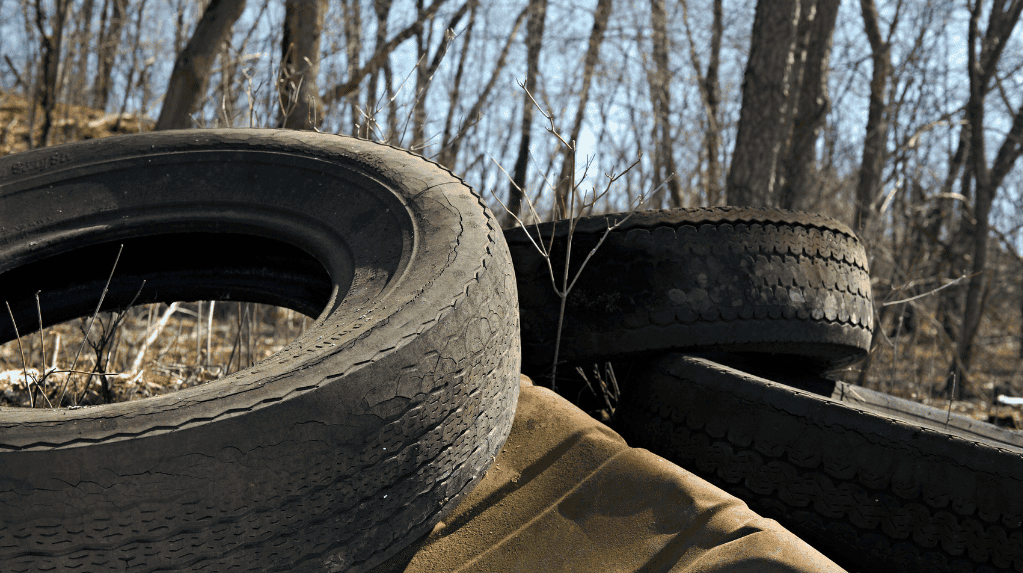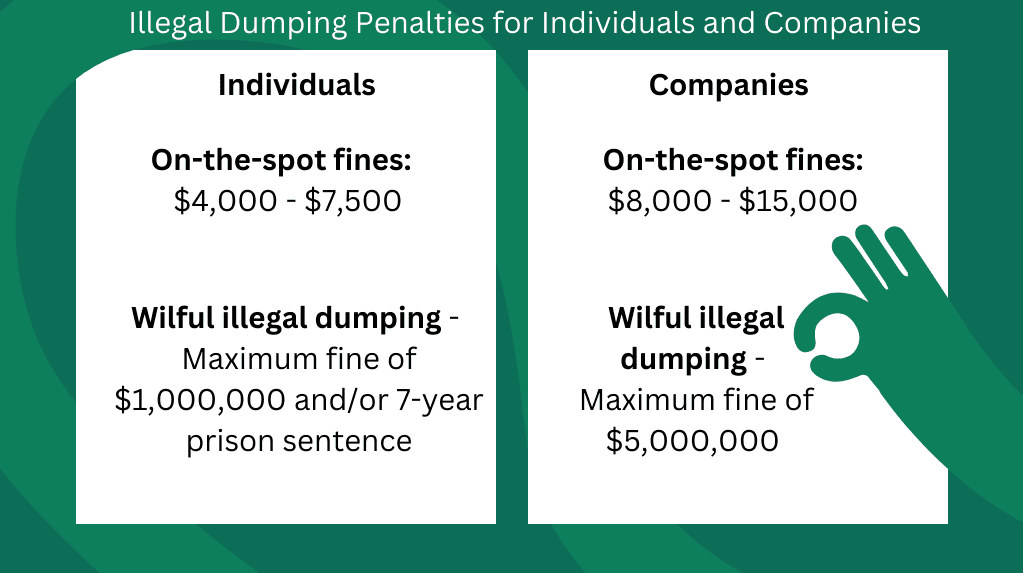
What is illegal dumping, who is responsible for enforcing it, and what are the penalties for individuals and companies found guilty in NSW?
If you’ve ever seen household junk or more egregious dumping of chemical or hazardous waste in New South Wales, then you’re certainly not alone. In NSW, over 7.8 million tonnes of waste is dumped each year, and of that amount, more than 1.3% (100,000 tonnes) of it is illegally dumped.
Needless to say, illegal dumping is an ongoing problem that the NSW state government has been trying to curb since the establishment of the Protection of the Environment Operations Act in 1997.
In 2023, it is estimated that roughly a third of households and a quarter of businesses in NSW are guilty of illegally dumping or disposing of waste. In this article, we’ll explore the laws that govern illegal waste disposal in NSW, the applicable fines, and penalties that individuals and business may face.
Table of contents
- What is considered illegal dumping?
- Enforcement of illegal dumping in NSW
- Illegal dumping penalties for individuals in NSW
- Illegal dumping penalties for companies in NSW
- Additional penalties for illegal dumping in NSW
- How to report illegal dumping in NSW
- How to avoid illegal dumping in NSW
What is considered illegal dumping?
Illegal dumping is the act of disposing of larger than litter-sized waste on land or in water sources without the proper authorisation or approvals.
Common examples of illegal dumping include kerbside dumping of household waste or furniture, bushland dumping of construction materials, and industrial disposal of chemicals into waterways

Enforcement of illegal dumping in NSW
The Protection of the Environment Operations Act (1997, POEO Act) is enforced by the Environment Protection Authority (EPA) and is the governing framework that governs illegal dumping and waste disposal in NSW.
The EPA strictly enforces laws that carry heavy penalties against illegal dumping to deter individuals or corporations from causing potential harm to human health and the environment. The penalties for breaching these laws include hefty fines of up to $500,000, jail terms of up to 2 years, and seizing of vehicles used in the act of illegal dumping.
Illegal dumping penalties for individuals in NSW
- On-the-spot fine: If caught in the act of illegal dumping by the EPA, individuals will be liable to pay a fine of $7500. This on-the-spot fine is $4000 if it is not issued by the EPA.
- Strict liability waste dumping offences: For strict liability dumping offences, Individuals can face a maximum fine of $250,000 if they provide false or misleading information to the EPA, with an additional daily fine of $60,000 for continuing offences. A strict liability offence means that the individual can still be considered guilty even if they were unaware that the information they provided was false or if they were unintentionally hindering an authorised officer.
- Wilful or negligent disposal of waste causing actual or likely harm to the environment: Wilful illegal dumping carries a maximum fine of $1,000,000 and/or a 7-year prison sentence for wilful offences. For negligent offences, the maximum punishment is a $500,000 fine and/or a 4-year prison sentence.

Illegal dumping penalties for companies in NSW
Companies generate significantly more waste than individuals and are, therefore, subject to bigger penalties to discourage illegal dumping.
- On-the-spot fine: Corporations found in the act of illegal dumping face an immediate $15,000 fine, if issued by the EPA ($8,000 otherwise).
- Strict liability waste dumping offences: Similar to the punishment for individuals, corporations can be considered liable for providing false information or delaying EPA investigations unintentionally under a strict liability offence. These offences can cost up to a maximum of $1,000,000, with an additional daily penalty of $120,000 for continuing offences.
- Wilful or negligent disposal of waste causing actual or likely harm to the environment: Companies that engage in illegal dumping wilfully will face a maximum fine of $5,000,000. If the dumping was done in negligence, the maximum fine is $2,000,000.
Additional penalties for illegal dumping
The POEO Act has also been recently amended to include the following penalties for illegal dumping:
- The seizing of vehicles used in repeat illegal dumping offences. If the offender is found guilty, the vehicle can be forfeited.
- Prison sentences of up to 2 years for repeat offenders.
- Requirements for the installation of GPS devices in waste transportation vehicles for compliance and movement tracking by the EPA.
- The repayment of any monetary benefit obtained as a result of the offence as an additional penalty.
How to report illegal dumping in NSW
If you witness illegal dumping being conducted or come across waste that has been illegally dumped, it is your responsibility to report it to the EPA to help keep our environment safe and clean.
In most cases, illegally dumped waste can be reported online to the EPA via RIDonline by providing the following information:
- A picture of the dumped waste
- The location of the incident (address or GPS location)
- A brief description of the waste
By submitting these details, you’ll be helping the EPA find and clean the dumped waste, take action against the offenders, as well as identify dumping hot spots to curb repeated behaviour in future.
However, if the waste dumped poses an emergency (fires, toxic fumes, asbestos), notify emergency services by calling 000 instead. Similarly, if the waste is an immediate threat to health and safety or the environment, call the EPA Environment Line at 131 555.

How to avoid illegal dumping in NSW
The penalties for illegal dumping have serious weight — not only do these offences contribute to a negative outcome for communities and the environment, but they can also hold disastrous consequences for you or your business.
To dispose of waste properly, you’ll need to understand what kind of waste it is. Certain types of waste (chemical, hazardous, e-waste) require special disposal methods to avoid environmental contamination that poses a threat to humans and nature.
For household waste, be sure to use council-provided bins for rubbish disposal. Bulkier items that cannot fit into bins should be disposed of at a licensed waste disposal facility or at scheduled council clean-up events.
Companies should take a look at their waste management plans to ensure that all waste is channelled to appropriate waste-processing facilities to avoid being charged with illegal dumping.
Final thoughts
Together with the Environment Protection Authority (EPA), the NSW state government continues to take strict, punitive action against individuals and companies found to be illegally dumping waste in NSW.
Given the strict dumping Laws, fines, and penalties that exist in New South Wales, companies and individuals must take a proactive approach to waste disposal. If you’re having trouble deciding how to deal with your waste, don’t take the easy (and potentially costly) option of dumping it illegally. Ridly Rubbish Removal offers hassle-free same-day rubbish removal in Sydney and its surrounding suburbs in NSW.